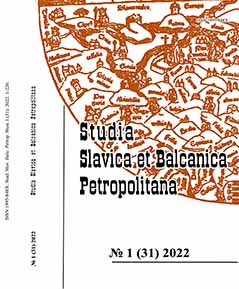Confessio vs natio. Византийская богословская традиция как препона в формировании дискурсов этнонациональной идентичности средневековой Руси
Confessio vs natio. Byzantine theological tradition as hindrance in formation of ethnic and national identity discourses in medieval Rus’
Author(s): Mikhail Vladimirovich DmitrievSubject(s): Christian Theology and Religion, Cultural history, Ethnohistory, History of ideas, Local History / Microhistory, Middle Ages, Modern Age, Politics and Identity
Published by: Издательство Исторического факультета СПбГУ
Keywords: Byzantine theology; confession; Christianity; ethnicity; old-Russian; Ukrainian-Belorussian; Ruthenian; cultural studies; medieval studies;
Summary/Abstract: This article attempts to verify some aspects of the research hypothesis which implies that normative orientations of the Byzanine orthodox theological thought (in ideologies, mentalities, discourses) contained traditions and constructions that were in odds with tendency to see communities of ethnic type in people whom we used to qualify as Russians and Ruthenians. In the East European Orthodox medieval Christian identity of groups included in the Church was thought of as a hindrance in forming discourses, which would claim that the Church community could be fragmented into ethnic and «national» groups (nationes). Old Russian texts, and texts of Muscovy, as well as writings of some Orthodox authors in Ruthenia (Ukraine and Belarus’) of the early 17th century have been taken in account. In these sources, very often, theological discourses were entering in conflict with tendency to transfer norms of ethnic (tribal) identity on the Christian communities. This generated a situation when «Russianness» was not perceived in ethnic terms, and in this respect relationships between Christian and «ethnic» were understood in a very different way, than in the theological culture of medieval West. Search for an explanation leads to the area of the Byzantine theological tradition, in which Christian and ethnic identities were regarded as two conflicting discourses. The Orthodox identity of emperor’s subjects was understood as «effacing» traces of tribal (ethnic) belonging. For subjects of Christian history (id est history of those, who got baptized) were regarded not the multiple nationes, but «new people» who became a united «nation of God». In medieval Rus, this discursive ligic was expressed by «Tale of the bygone years»; the same discursive «scenario» seems to be implemented in other texts of Russian Middle Ages, and this lead to Orthodox culture of Muscovy, which repelled the ethnic definition of «Russianness». It is very likely, that the same tendency was alive — disappearing and reappearing — in the worldview of literati and broader circles of the Orthodox population of Ruthenian lands.
Journal: Петербургские славянские и балканские исследования
- Issue Year: 2022
- Issue No: 1(31)
- Page Range: 83-104
- Page Count: 22
- Language: Russian

